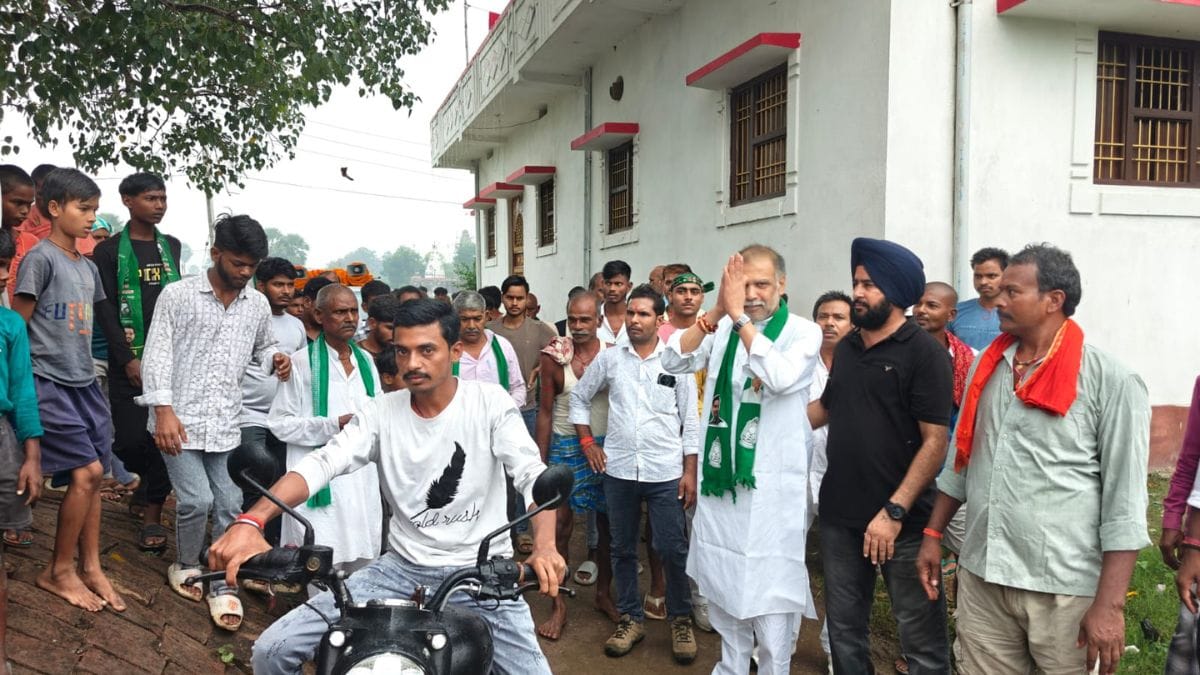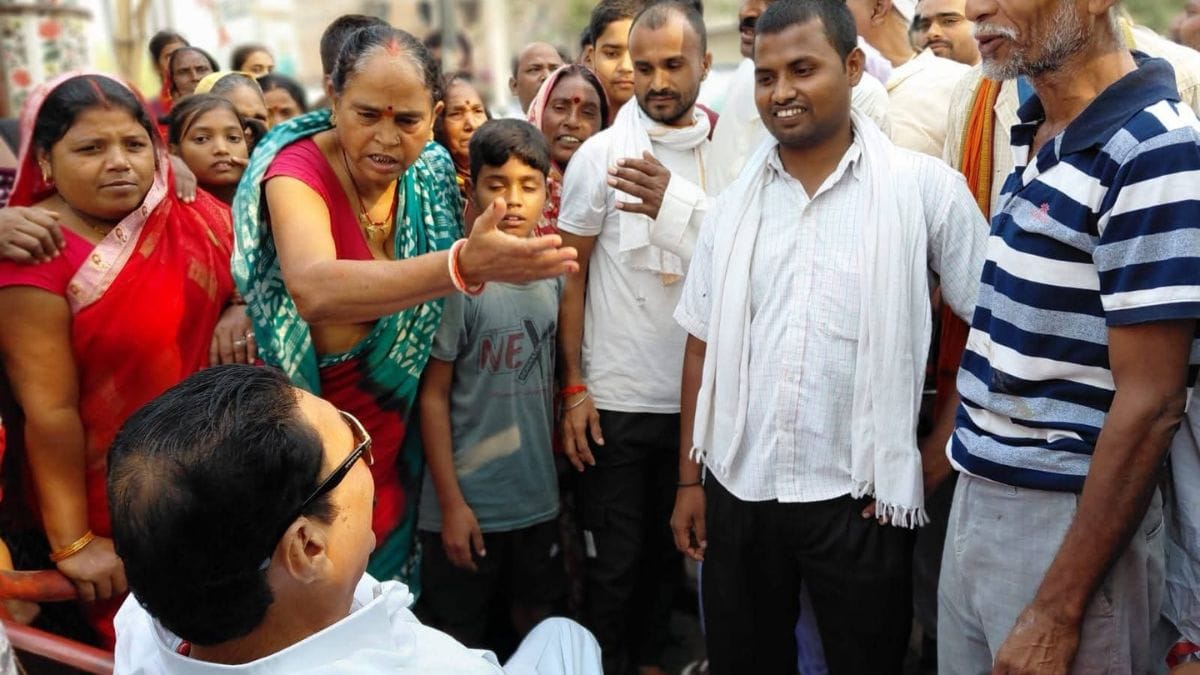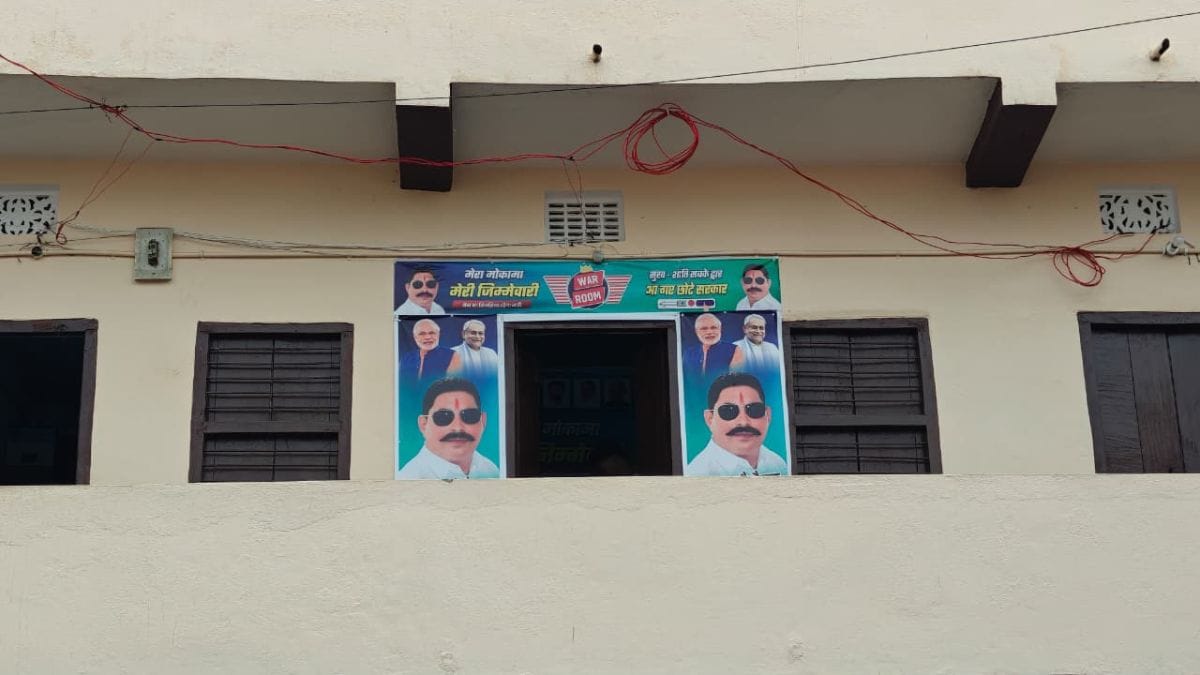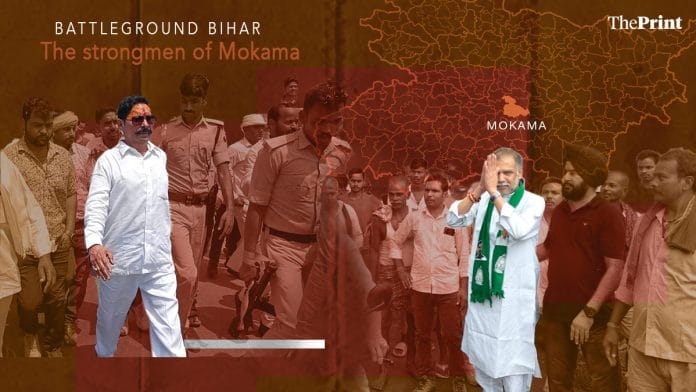Mokama, Bihar: An elderly man gets out of his SUV, waves at scores of supporters and says, “Sab mai bahin ke jarurat padtai…hum beta bain ke kaaj karbai (All mothers, sisters will need help, and I will work for you like a son).”
A week before the Bihar assembly elections, this is a familiar script, but there is a twist. The man who now folds his hands before the residents of Manikpur village, once ruled the streets of Mokama with his muscle power, but is currently disqualified from contesting the polls. It has not stopped him, though, from campaigning for his wife, who is seeking election from Mokama in his place as the Rashtriya Janata Dal (RJD) candidate.
Suraj Bhan Singh (60) was sentenced to life in 2008 for a 1992 murder in the neighbouring Begusarai district. His wife, Veena Devi, is now his only door to electoral power in Mokama.

Veena Devi is contesting against another Mokama strongman, Anant Kumar Singh (58), the Janata Dal (United) candidate now in the eye of a storm since his arrest in connection with the murder case of Jan Suraaj supporter Dular Chand Yadav.
Suraj Bhan and Anant Singh, both from the Bhumihar community, have not clashed for nearly two decades now. This election is the closest semblance of a fight between them in years. It was in the 1990s that the two shifted from bullets to ballots, a statewide trend then.

The rural township of Mokama stretches along the Ganga, just 70 kilometres from Patna. The constituency has a bloody history of crime and politics, which is probably what made these musclemen politically indispensable for Nitish Kumar’s JD(U) and Lalu Prasad Yadav’s RJD. Gunfire and stone pelting between political opponents are commonplace, and Dular Chand’s killing has marked a new chapter.
Jan Suraaj campaigner Dular Chand died Thursday in a clash between workers of JD(U) and Prashant Kishor’s party in Mokama. Police investigation reveals convoys of Jan Suraaj’s Mokama candidate Piyush Priyadarshi and JD(U)’s Anant Singh had a confrontation, followed by stone-pelting and gunfire.
Dular Chand was killed due to injury to his heart and lungs, Patna Senior Superintendent of Police Kartikeya Sharma said, adding that Anant Singh and his aides were at the scene at the time of the incident.
This is not the first time a violent incident has disrupted the calm in Mokama. Both Suraj Bhan and Anant Singh gained notoriety over instances of extortion and murders in the region before they joined politics.
The residents of Mokama are fed up of the endless cycle of crime. “There is no way to live peacefully in Mokama and this region. We have had enough of these murders and the sound of gunshots. We want peace, just as other parts of the state and country. Every other constituency moved on long ago, but Mokama appears to still be in the grip of violence,” Nadwan resident Amlesh Kumar (52) told ThePrint.
Suraj Bhan, Anant Singh & their common link
Ram Nandan Singh earned a meagre salary at a local shop in Mokama. It was nowhere enough to feed his large family, which included six children from his two marriages.
His son, Suraj Bhan, was an infant when his mother, Ram Nandan Singh’s first wife, died. When the elder son, Raja Singh, got a job with the Central Reserve Police Force (CRPF), it was a “light at the end of the tunnel” for the family.
Meanwhile, Suraj Bhan had set his eyes on becoming the “undisputed king” of the region. His “dream”, however, cost him his father.
In 1989, Suraj Bhan’s elder cousin, Moti Singh, an emerging local strongman, was killed in an inter-gang rivalry. Suraj Bhan stepped into his cousin’s shoes when he allegedly entered the world of crime in the 1990s. His father, though, passed away some time after.
Earlier, Ram Nandan Singh allegedly told his friend, a shopkeeper, that he had been getting complaints about his son’s crimes and had resolved not to return home. “He jumped into the [Ganga] river and did not return,” a neighbour, who did not wish to be named, told ThePrint.
In another setback, Suraj Bhan’s brother Raja Singh died by suicide, months after his marriage. He had been transferred out of the local CRPF formation in Mokama. Raja allegedly wanted Suraj to threaten the local senior officer into halting his transfer. But Suraj cited limitations of his sway. “He told his brother, ‘I can do anything for you, I can threaten anyone, but how can the administration be coerced directly?” another neighbour told ThePrint on the condition of anonymity. “The transfer, after a new marriage, led Raja to shoot himself dead at his camp.”
Anant Singh was the youngest of Chandradeep Singh’s four sons. Having served as a caretaker of a temple near the family’s ancestral home in Mokama’s Nadwan village for more than three decades, Nityanand Pandey recalls Chandradeep Singh only as a “saint who could not get off his habit of praying with a mala”.

Among his four sons, the eldest, Biranchi Singh, became pradhan of Nadwan village. It was his murder in the 1980s that put Anant Singh on the path of violence. While no one clearly recalls him swimming across the river to avenge his brother, no one rules out the possibility. “Every unreal thing you possibly have heard about him is more likely to be true than false,” a villager outside his house told ThePrint.
Anant’s brother Dilip Singh brought mainstream politics and an alleged cover for crimes to Nadwan. He was first noticed by the then local MLA from the Congress, Shyam Sundar Singh Dhiraj. Dhiraj was a minister in the then-Bihar government of Jagannath Mishra.
Dhiraj and Dilip forged a symbiotic relationship in the face of a common adversary, Munilal Singh. From the Bhumihar community, Munilal was another strongman, with influence over Nadwan and nearby villages.
“Dilip Singh approached me months after the 1980 assembly elections. Munilal Singh had done everything to defeat me. He had captured nearly half a dozen polling booths. Similarly, Dilip had faced a challenge from Munilal. Our relationship was for our benefit. It continued for nearly one and a half years,” Dhiraj told ThePrint, sitting in his residence in Patna’s outskirts.
The two then had a falling out. It was when CM Jagganath Mishra approached Dilip Singh directly to teach him a lesson for protesting against him, Dhiraj said. Later, Dilip secured a Janata Dal ticket and contested the 1985 assembly elections from Mokama against his political godfather, but lost to Dhiraj by just 2,678 votes. The battle, however, showed that he was a force to be reckoned with. Their rivalry intensified, and Dilip had the last laugh after defeating Dhiraj in the 1990 Mokama assembly poll.
Dhiraj, as well as police officers of the time, say Anant Singh was in the background all along, increasing muscle power in Mokama by leveraging Dilip’s political clout.
Meanwhile, Suraj Bhan, who had allied with Uttar Pradesh-based gangster Shriprakash Shukla, was gaining prominence for his own operations. Later, Dhiraj helped him gain a foothold in Mokama’s politics in yet another battle of survival as he allegedly faced threats from Dilip Singh.
Railway & NTPC contracts
Dilip Singh brought riches to Anant Singh and his clan.
Suraj Bhan bid for railway contracts in Bihar to keep his coffers full. He, however, had a bigger ambition. He wanted to extend his business beyond the state into UP’s Gorakhpur railway division. Making a breakthrough was fraught with danger, as the crime landscape in Gorakhpur was already crowded. There were two regional strongmen: Virendra Pratap Shahi and MLA Hari Shankar Tiwari, who later became a minister in the UP government.
Senior police officers point out that Shahi was killed in Lucknow in 1997. The murder was said to have been carried out under the direction of Suraj Bhan, who was an accused in the case. It, however, paved Suraj’s way into the business in Gorakhpur.
In 1998, Suraj Bhan was arrested in a different case in Bihar’s Nalanda district. His arrest followed a shootout with patrolling police a year before, retired IPS officer Amitabh Kumar Das recalled. “One of the sub-inspectors got hit in the chest, but thankfully, survived. It was a matter of prestige for the police to patrol more after the violence,” Das said, remembering the chain of events when he was local additional superintendent of police.
He recalled the intense exchange of fire between Suraj Bhan’s gang and the police before a bullet hit Suraj’s toe. One of Suraj’s neighbours, quoted earlier, said, “He fell into the gutter and could not be rescued for hours. The gunshot wound got severely contaminated. The band-aid on his right foot is from that wound. It never healed.”
Suraj Bhan controlled all railway contracts between Patna and the Mokama region, Das said. He continued to thrive when Nitish Kumar became the Union railways minister.
Meanwhile, Anant Singh allegedly got access to contracts at the National Thermal Power Corporation’s Barh plant and, by 1999, was accumulating money by controlling tenders and favouring bidders. “Every contract of NTPC Barh went directly or indirectly to Anant Singh or his front men,” said Das.
Also Read: Bihar polls & the complex caste dynamic: How parties are sticking to tried-and-tested strategies
Nitish & Ram Vilas
Shyam Sundar Singh Dhiraj recalled that when Suraj Bhan met him before the 2000 assembly elections, he expressed a willingness to contest from Mokama and sought his blessings. “Chela tohar MLA bain gelai. Hamko bhi ashirwad dijiye (Your disciple has become an MLA. Give me your blessings, too),” Dhiraj quoted Suraj Bhan as saying.
Making his political debut, Suraj Bhan defeated Dilip Singh in the 2000 elections. This victory marked a power split, following which Suraj Bhan and Dilip’s brother, Anant Singh, emerged as rivals in Mokama, politically and in terms of local influence.
Nearly four years later, in February 2004, Suraj Bhan joined the Lok Janshakti Party (LJP) at a public meeting in Patna’s Gandhi Maidan. He continued to hold political positions, while his convictions and acquittals in different criminal cases continued. Then, the Ram Vilas Paswan-led LJP fielded him as a Lok Sabha candidate from Balia in the 2004 Lok Sabha elections. He defeated his nearest rival by a margin of 76,227 votes.
Anant Singh made his political debut in the first of the two Mokama assembly elections in 2005, scoring a win. He won in the second assembly poll in October, as well.
In 2006, Dilip Singh died from a heart attack at the age of 56.
Anant Singh continued to win from Mokama, first in 2010 and then in 2015. Although the brothers’ ancestral village of Nadwan falls under the Barh assembly constituency, both Anant Singh and his brother always contested from Mokama, banking on the constituency’s sizable Bhumihar population.
Vijay Kumar Singh (37), a businessman in Mokama, attributed Anant Singh’s wins to his larger-than-life presence across the assembly constituency. “He is everywhere, available to common people, despite all the criminal and other history associated with him. Here, he is a parallel government,” he told ThePrint.
Anant Singh further established his political clout in 2006 when Nitish Kumar and his confidant Rajeev Ranjan Singh, also known as Lalan Singh, made their way to Nadwan for the final rites of his elder brother, Fazo Singh, who was killed in intergang rivalry.
“Nitish ji ka ana sandesh tha ki chhote sarkar ko koi hath ni laga sakta (Nitish’s presence in Nadwan was a signal [to the local administration] that Anant Singh enjoyed political patronage right at the top), further strengthening his command over the village and local administration,” said businessman Vijay Kumar Singh.
Such was his sway
IPS officer Das attributed Anant Singh’s political successes to Nitish Kumar, since Anant rose to power in 2005. But he also pointed out their 2015 fallout. Accused of killing a young man from the dominant Yadav community that year, Anant Singh faced a huge Bihar Police crackdown, only months before the 2015 assembly elections. A police team, led by the then senior superintendent of police in Patna, arrested him at his residence. But not before he had created quite a stir.
He was denied a ticket by the JD(U), in an alliance with the RJD at the time. Instead, Anant was shifted to Bhagalpur jail to ensure the smooth running of law and order in Mokama during the polls. But such was his sway over the Mokama constituency that Anant Singh won the 2015 assembly elections as an Independent against all odds.
In the 2019 Lok Sabha elections, Anant Singh lobbied for a Congress ticket for his wife, Neelam Devi. He wanted her to contest against JD(U)’s Lalan Singh, another Bhumihar leader. He also mended ties with RJD patriarch Lalu Prasad Yadav and secured a ticket in the 2020 assembly elections. He again won the Mokama seat.
In 2024, Anant Singh was released from Beur jail by the Bihar home department on a 15-day parole to resolve an “ancestral property matter”. This was amid the Lok Sabha elections, and he wasted no time in canvassing for support for Lalan Singh.
Meanwhile, Suraj Bhan Singh’s political career got sidelined after a life term was handed down to him in the 1992 murder case of a farmer. His appeal against the life sentence remains pending for more than 17 years before the Patna High Court, but the same court rejected his plea to contest elections. His wife, Veena Devi, won the 2014 Lok Sabha elections from Munger, defeating JD(U)’s Lalan Singh.
“Suraj Bhan Singh challenged the might of the Nadwan gangsters in the Mokama market. The market shut down at least three days a week due to incidents caused by Anant or Dilip Singh’s men,” said a 47-year-old Mokama resident Ram Kumar as he read about the recent clash in a Hindi daily. “Suraj is always available for people in his neighbourhood, and we will happily vote for him [his wife], this time, again.”
Arrests & acquittals
Strongman Chhotan Shukla was killed on 4 December 1994, allegedly by the henchmen of the then Bihar cabinet minister and strongman, Brij Bihari Prasad. Chhotan Shukla’s murder was followed by a bloodbath on Bihar’s streets. This included the murder of IAS officer and then district magistrate of Gopalganj, G. Krishnaiah, during Shukla’s funeral procession. Four years later, on 13 June 1998, Brij Bihari Prasad was shot while admitted in the Indira Gandhi Institute of Medical Science, leading to his death. His shooters were Shukla’s younger brother Munna Shukla, UP gangster Sriprakash Shukla, etc.
A Patna court in August 2009 sentenced Suraj Bhan to life imprisonment for hatching the conspiracy behind Prasad’s murder. He had allegedly met Munna Shukla during his stay at the Beur Central Jail. The Patna High Court, however, stayed his conviction in July 2014, flagging lapses in the Central Bureau of Investigation’s probe.
Later, the Supreme Court upheld the CBI investigation, relying on the same materials. It set aside the HC’s judgment but acquitted Suraj Bhan Singh and three more accused on the grounds of “benefit of doubt”.
Anant Singh, too, has been oscillating between crackdowns and bursts of leniency. In the aftermath of allegedly killing a Yadav community member, his arrest from his home in Patna’s Nadwan village on 16 August 2019 led to the recovery of an AK-47 rifle, 22 cartridges, and two bombs. He was then charged under the Unlawful Activities (Prevention) Act and the Arms and Explosives Act.
‘Chhote sarkar’ Anant Singh immediately disappeared from Mokama, only to resurface in Delhi to surrender before the court. The Bihar Police went to Delhi to arrest him, and the unapologetic and colloquially “abusive” language he used in interviews with local news and YouTube channels, at the time, created a buzz. Then, in 2022, a local court in Patna convicted him for 10 years. This led to his disqualification from the Bihar legislative assembly. His wife, Neelam Devi, contested the Mokama seat, subsequently, and won the by-election.
The Patna High Court acquitted Anant Singh in the arms case in August 2024—a verdict yet to be challenged by the Bihar government. A local gang, including Sonu and Monu, challenged his power in January this year, leading to the firing of more than 100 rounds on Mokama’s streets. Anant Singh surrendered before the court in the firing case and was released on bail this August. Now, he has been arrested in the Dular Chand murder case.
“The saga of these elements becoming powerful and enjoying political patronage can be attributed to the lack of an accountable judicial process. A series of acquittals in cases by top courts, despite the lower courts finding the evidence sufficient enough to hand life imprisonment, has marred the process of taking these cases to a logical conclusion,” retired IPS officer Abhayanand, credited with launching a campaign against criminal cum political figures in Bihar, lamented.
(Edited by Madhurita Goswami)
Also Read: Inside INDIA bloc’s move to name Tejashwi Yadav as Bihar CM face after weeks of uncertainty






